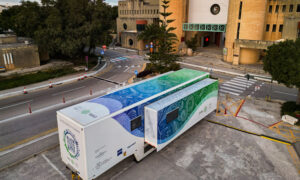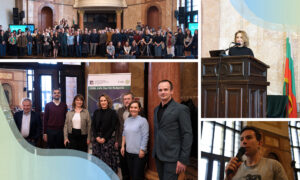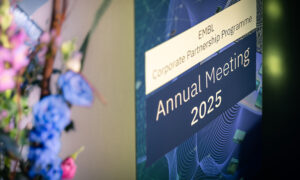
Beginning a PhD at warp speed
A Latvian PhD student gets an intensive EMBL introduction to microscopy that familiarised him with a variety of tools and capabilities to apply at home institute in Riga

An interest in getting more training on light microscopy proved to be anything but ‘light’.
Kristaps Krims-Dāvis, a pharmaceutical chemistry PhD student at Rīga Stradiņš University in Latvia, spent a month at EMBL Heidelberg as a scientific visitor, where courses, job shadowing, and a variety of informal training opportunities went far beyond his expectations. In addition to getting hands-on experience with microscopes at his home institution, he connected with several researchers in the EMBL Imaging Centre and received fairly intensive theoretical and practical training.
However, this is just one example of how member state research institutions connect with EMBL to tap into its resources and raise the level of science throughout Europe.
Latvia became EMBL’s 29th member state in late 2023. EMBL’s relationship with Latvia has gradually grown in recent years, especially during the period of prospect membership that kicked off in 2020. In 2023, an EMBL Information Day was held in Riga to raise awareness of opportunities available at EMBL among Latvian researchers and encourage more scientific exchanges and collaborations. Additionally, a memorandum of understanding with Latvia’s Biomedical Research and Study Centre was designed to improve academic exchanges like Krims-Dāvis’s, as well as encourage more sharing of scientific data, key technologies, and scientific talent. This past year, EMBL’s flagship research project TREC – Traversing European Coastlines – stopped in Latvia to team up with the Latvian Institute of Aquatic Ecology for soil, water, and air sampling at sites around Riga.
Krims-Dāvis recently shared his thoughts with us about his EMBL experience:
Why did you want to visit EMBL and have these various experiences?
My supervisors and I were looking for a place for me to get more training on light microscopy. Latvia became a member of EMBL quite recently, and when we were introduced to the possibilities at EMBL we noticed that the Imaging Centre. EMBL’s Imaging Centre has the same microscope that we do, so it was the perfect place for this training. I was hoping to get training on Stimulated Emission Depletion (STED) microscopy because it will be a big part of my PhD thesis. Additionally, I was hoping to get more confident in microscopy and gather new ideas on how to improve my work.
What did you do while at EMBL?
I was at EMBL for about a month. My first week was mostly an introduction. I met the team and attended an industry day and microscopy-related symposia, where I met experienced people from a wide selection of fields and learned about different ways microscopy techniques are applied. The next week, I attended STED and MINFLUX courses. The week felt long as the training was pretty intense. For me, it was a great starting point. We had theory lectures as well as practical lessons where we learned how to prepare samples, set up the system, and image samples. My last two weeks were spent job shadowing. I first shadowed Dietrich Walsh, an application specialist on the light microscopy team. He had some users who had booked a microscope to work on, so I could see the workflow right from the beginning. Later I worked with Timo Zimmermann, who leads the light microscopy team. He explained some theory behind fluorescence-lifetime imaging microscopy (FLIM) and then showed example applications. I also had a chance to shadow personnel from Leica – one of the EMBL Imaging Centre’s industrial partners – and other members of the light microscopy team.
What was most memorable and likely to be impactful in your research career?
Honestly, it is hard to single out anything specific because everything was impressive. If I had to pick the most impactful part for my current research, it would be the STED microscopy experience. It was great to see it in action while shadowing other researchers. I had a chance to ask many questions, exchange experiences, and make connections. Another fascinating technology is MINFLUX. Although it’s a more complex technique, EMBL’s experts made it look easy. However, cryo-EM was the most impressive technology I was introduced to – perhaps because I understand very little of it, at this point, and the EMBL projects using it are all incredible, especially those combined with light microscopy.
What are your impressions of EMBL now?
I must say that everyone at EMBL is welcoming, friendly, and very knowledgeable. They are always willing to answer questions about sample preparation, system configuration, or imaging techniques, and they genuinely enjoy helping to find the best solutions and methods. It is an excellent place to come if you have questions about microscopy.
Any additional reflections on your time at EMBL?
I am grateful that I got to spend time at EMBL and learn from experts. Exchanging experiences gave me new ideas for my project, and I can say I am much more confident now in working with our own microscope. Seeing all the amazing work done at EMBL showed me a range of possibilities, which has inspired me to learn even more about microscopy methods and improve my techniques. Spending a month among experts is the best opportunity to learn new methods, gather new ideas, and make connections. I only just started my PhD, and I must say, I don’t think there is a better way to do so than having an experience like this. I want to thank Timo and his team for welcoming me, showing me around, and training me. I hope this connection with EMBL will lead to possible future collaborations.


